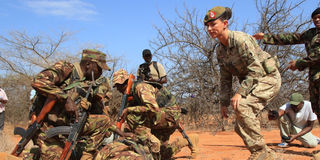UK admits it used hazardous white phosphorus in Kenya

A British soldier (right) gives instructions during a joint training with KDF at Archer’s Post in Samburu County on October 7, 2020.
The United Kingdom has admitted that its soldiers used dangerous white phosphorus mortar rounds during training in Kenya when conditions permitted their use.
Mr James Heappey, the Parliamentary Undersecretary of State for the Armed Forces said the substance provided “illumination for night training as well as smoke screening reasons”.
White phosphorus is extremely toxic to humans. It can also be quite unstable. It ignites instantly when it comes into contact with oxygen.
Its primary function in weaponry is to burn fast and bright. Once ignited, white phosphorus is extremely difficult to extinguish. It is often used in incendiary munitions by militaries worldwide, including the United States, to illuminate targets as part of tracer munitions at night.
The substance sticks to many surfaces, including skin and clothing.
Experts say these weapons are illegal under international humanitarian law and other international laws and treaties such as the 1980 Protocol on Incendiary Weapons; the 1992 Chemical Weapons Convention; and the 1997 International Convention for the Suppression of Terrorist Bombings, among others).
Internal army study
According to an internal army study obtained by Declassified UK, live mortar firing occurs in regions “frequented by farmers, villagers, and nomadic tribes-people”.
British MP Kenny MacAskill, who uncovered the use of white phosphorus in Kenya by the army, said the dangers of the chemical are well documented and have caused injury and misery in many conflicts.
“That it should be used in training exercises near where civilians are located or through where they'll pass is highly dangerous. It just shouldn't be happening and the Ministry of Defence should cease this practice,” Mr MacAskill said in Parliament.
The British Army Training Unit Kenya (Batuk) has been accused of murder, rape, sexual assaults, environmental damage, sexual exploitation of Kenyan women, and deaths caused by the negligent handling of unexploded ordnance.
Some 1,496 residents of the Lolldaiga community in Laikipia have sued Batuk for starting a fire that destroyed more than 10,000 acres at the conservancy.
Other than environmental damage, the surrounding community claims the disaster triggered a human-wildlife crisis, forcing animals searching for water and pasture to invade their farms.
Unexploded mortar fuse
The fire, which emitted smoke containing dangerous chemicals, has caused adverse health effects such as serious eye-sight problems and miscarriages in humans and livestock.
Some of the community members close to the ranch have since been forced to abandon their homes due to the howling hot winds.
In 2015, 13-year-old Kenyan boy, Lisoka Lesasuyan, lost both arms and an eye when he picked up an unexploded mortar fuse. The type of fuse was withdrawn from British army service in 2019 after it was found to contain the poisonous and explosive substance Tetryl, Labour MP Clive Lewis was told.
Tetryl can affect the nervous, digestive, and respiratory systems. Its manufacture in the United States was stopped as far back as 1973, and the Pentagon is destroying the remaining stocks.
Last November, Kenyan police reopened a case into the 2012 murder of 21-year-old Agnes Wanjiru, who was last seen with a British soldier from a military base in Nanyuki.
The young mother disappeared and was later found dead in a septic tank behind the hotel.
Last October, the Sunday Times reported that a British soldier confessed to killing Wanjiru and showed comrades where he dumped her body. The crime was reported but dismissed by military officials.





